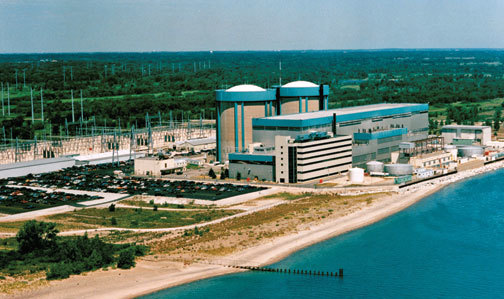In the face of widespread agreement on the need for more energy production, Exelon Corp.—one of the nation’s largest electric utilities—is paying $1 billion to dismantle its 2100 megawatt Zion nuclear power plant in northern Illinois. Exelon has given varying answers for its decision, but Nancy Thorner, who lives a proverbial stone’s throw away from the Zion nuclear power plant, is on a one-woman crusade to inform the public the planned shutdown of the Zion power plant would keep electricity prices artificially high.
Customers Financed Plant
In 1998, when energy prices were much lower than today, Commonwealth Edison, which in 2000 merged with PECO Energy and Unicom to form Exelon, made a business decision to shut down the Zion plant rather than pay $435 million for a necessary replacement of steam generators. With electricity prices relatively low and forecast to trend even lower in future years, ComEd could not profitably recoup the costs for the steam generators, the utility explained at the time.
ComEd made this decision even though it had obtained funding for the Zion plant by requiring customers to pay higher power bills in advance of the station being built. The justification asserted for making customers pay in advance was that Zion would thereafter deliver affordable, reliable electricity that would justify the up-front costs.
“Commonwealth Edison paid prices set by a regulator based on covering the utility company’s cost for building the facilities required to supply reliable electricity plus a guaranteed profit,” Rod Adams, editor of the Atomic Insights blog, explained in Atomic Insights on Dec. 11. “The customers had no choice about paying—the only alternative available for them was doing without electricity. The balancing part of those protected monopoly agreements on the part of the profit-making utility company for this rather sweet deal was that they promised to make prudent decisions and undertook an obligation to serve their customers.”
Electricity Prices Have Risen
Although ComEd forecast in 1998 that electricity prices would decline, they have in fact risen dramatically, undercutting the initial rationale for closing the plant.
Adams, Thorner, and Illinois State Senator Chris Lauzen (R-Aurora) say they suspect Exelon’s decision to shut down the plant despite the higher-than-projected price of electricity may be motivated by a desire to fleece ratepayers and keep electricity prices artificially high.
In November Lauzen sent Exelon a letter inquiring about its decision to shut down Zion, but the company has yet to reply.
“A thoughtful consideration of the facts surrounding the Zion/Exelon controversy suggests that a restart of Zion by Exelon would lower electric rates in its service area and reduce the profits from Exelon’s other units,” says Thorner.
Still Cheaper Than Alternatives
Thorner wonders what legitimate motive Exelon could have for spending $1 billion to dismantle the plant. Even if it were to cost $2 billion to restart the plant, $2 billion is a relatively small investment to produce 2100 megawatts of emissions-free power, especially when it is only $1 billion more than the cost of dismantling the unit at a time when there is a strong national will to produce more energy; and particularly emissions-free energy.
The net cost of $500,000 per megawatt to produce emissions-free nuclear power at Zion rather than dismantling the plant pales in comparison to the $6 million per megawatt that Exelon is paying to produce 60 megawatts of solar power in Chicago and the $1.2 million per megawatt Exelon recently paid to purchase 1,000 megawatts of wind power from Deere & Co.
Gaming Renewable Power
Thorner points out Exelon has close ties with the Obama administration and is pushing hard for renewable power mandates and carbon dioxide reduction credits to be given to utilities that have invested in wind and solar power.
“Illinois is spending a fortune on expensive wind and solar power that costs three times as much and blights our landscape, with little power to show for it, based on the claim that man is causing global warming and that CO2 is the culprit. This makes the closing of Zion even more suspect, because nuclear power is emissions-free energy and gives the biggest bang for the buck.”
James M. Taylor ([email protected]) is managing editor of Environment & Climate News.





